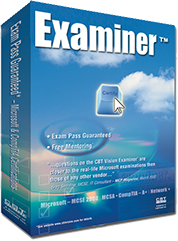Examiner - SY0-101
 |
Examiner™ for CompTIA Exam SY0-101: |
Exam Information*
| Exam # : | Time Limit : | Passing Score : | Exam Questions : | Examiner Questions : | Format : | Certifications : |
| SY0-101 | 90 min. | 764 on a scale of 100-900 | * 100 | 272 | Traditional | Security+ |
* CompTIA may incorporate newer testing technologies or content into a given exam at any time. It may change the characteristics of its exams without prior notice.
It's an insecure world. People that operate computer networks are reminded of that about once a day, at the very least. The people at CompTIA are also aware of this fact. They consider computer security important. When CompTIA considers a subject important, they create a certification exam that will test people on how much they know about that subject. Once people pass the exam, they are certified for life. Employers can count on those people to be able to do certain jobs for them competently. The nice thing about many CompTIA exams is that, although they require some experience and familiarity with the subject matter, passing the exams is not out of reach for people with a fair amount of experience, aptitude and determination. You don't usually need to be a subject matter expert or guru to pass a CompTIA exam. You may need some help getting up to speed, however. Examiner for: Security+ is designed to help you master subjects like those listed below. Consider this list only a taste of what CompTIA thinks that you should know about security before they certify you.
General Security Concepts 30%
- Access Control: Can you distinguish among MAC, DAC and RBAC.
- Authentication: A singularly important topic with many facets.
- Services and Protocols: Disabling what you don't need to run.
- Attacks: Lots to choose from. You need to know most of them.
- Malicious Code: When "good" programmers go bad, watch out!
- Social Engineering: It isn't just the hardware and software that attackers try to play with.
- Auditing: You must.
Communication Security 20 %
- Who's snooping around your email, your remote access, your Web site, your instant messaging, your file transfers and your new wireless network? You should know. You should know how to stop them.
- You need to know how all this snooping is accomplished.
Infrastructure Security 20%
- Devices such as firewalls, routers, switches, wireless and modems can help you secure your environment or become part of the problem.
- Media such as coaxial cable, UTP/STP, fiber need to be secured.
- Removable media, such as tapes and CDRs need to be secured.
- Storage media such as hard drives, diskettes and flashcards need to be secured.
- You need to know what secure topologies and intrusion detection systems are all about.
- You need to be able to establish security baselines and harden your applications.
Basics of Cryptography 15%
- The basics of cryptology involve hashing algorithms, distinguishing between symmetric and asymmetric encryption and the like.
- Other topics include PKI, certificates, and a raft of standards and protocols.
- You'll also need to be familiar with the key management/certificate lifecycle.
Operational/Organizational Security 15%
- This broad-sounding topic includes:
- Physical security
- Disaster recovery
- Business continuity
- and Documentation to name a few.
A complete summary of everything you need to know is found here.
If you'd like to feel secure about passing Security+, buy Examiner for Security+.
Examiner™ has everything you need to pass your exam.
